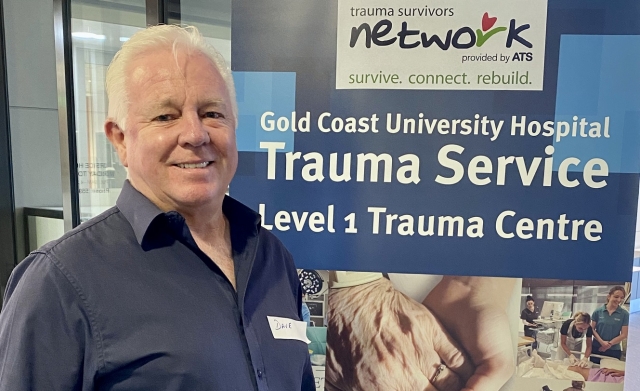
Gold Coast Health’s Trauma Survivors Network (TSN), a first-of-a-kind program in Australia, is having a profound impact on the mental wellbeing of trauma survivors.
The network’s first peer ambassador, David Bell, 59, is connecting with trauma patients and sharing his extraordinary journey after overcoming compounding traumatic life events.
“I survived two strokes and had to learn to walk again, followed by the breakdown of my 35-year marriage and a life-changing motorcycle accident, all within five years,” he said.
“13-months ago, I was as airlifted to Gold Coast University Hospital (GCUH), where I spent weeks in a coma, after breaking more than 20 bones and sustaining critical chest injuries due to a horrific motorcycle accident.
“The great team here put me back together. It took a few months to bounce back, all thanks to the wonderful work of great doctors, nurses, and therapists.
David was introduced to the TSN through the health service and now he’s visiting and speaking to other trauma patients about how they will rebuild their lives after being discharged from hospital.
“One thing that I found over the last five years, the ups and downs in part due to anxiety and depression after the physical recovery, is very confronting,” he added.
“Now I’m using my experience to help others and it’s given me a whole new lease on life.”
Developed by the American Trauma Society (ATS USA), Gold Coast Health introduced the TSN program two years ago to assist survivors, families, and caregivers in the long-term.
Trauma Nurse Navigator and TSN coordinator, Matthew Scott, says the network is steadily growing and hopes the program is extended throughout Queensland and Australia.
“Peer ambassadors support other survivors that are in hospital to show them that there is a path forward after their physical wounds heal,” he said.
“As a level-one trauma centre specialising in major trauma injury management, our hospital deals with severe trauma patients, so the outcomes tend to be more long-term. Ideally, this peer-to-peer level of support is what’s also needed in other facilities.
“There is so much more than just physical trauma for patients to overcome and things that can’t be seen such as psychology injury, are what we are trying to address.”
From 2018-2021, there were 1375 trauma patients treated at GCUH with 56 per cent of cases arising from transport related incidents involving motor vehicles and motorbikes.
To connect with other trauma survivors or to learn more visit: www.traumasurvivorsnetwork.org/pages/home



